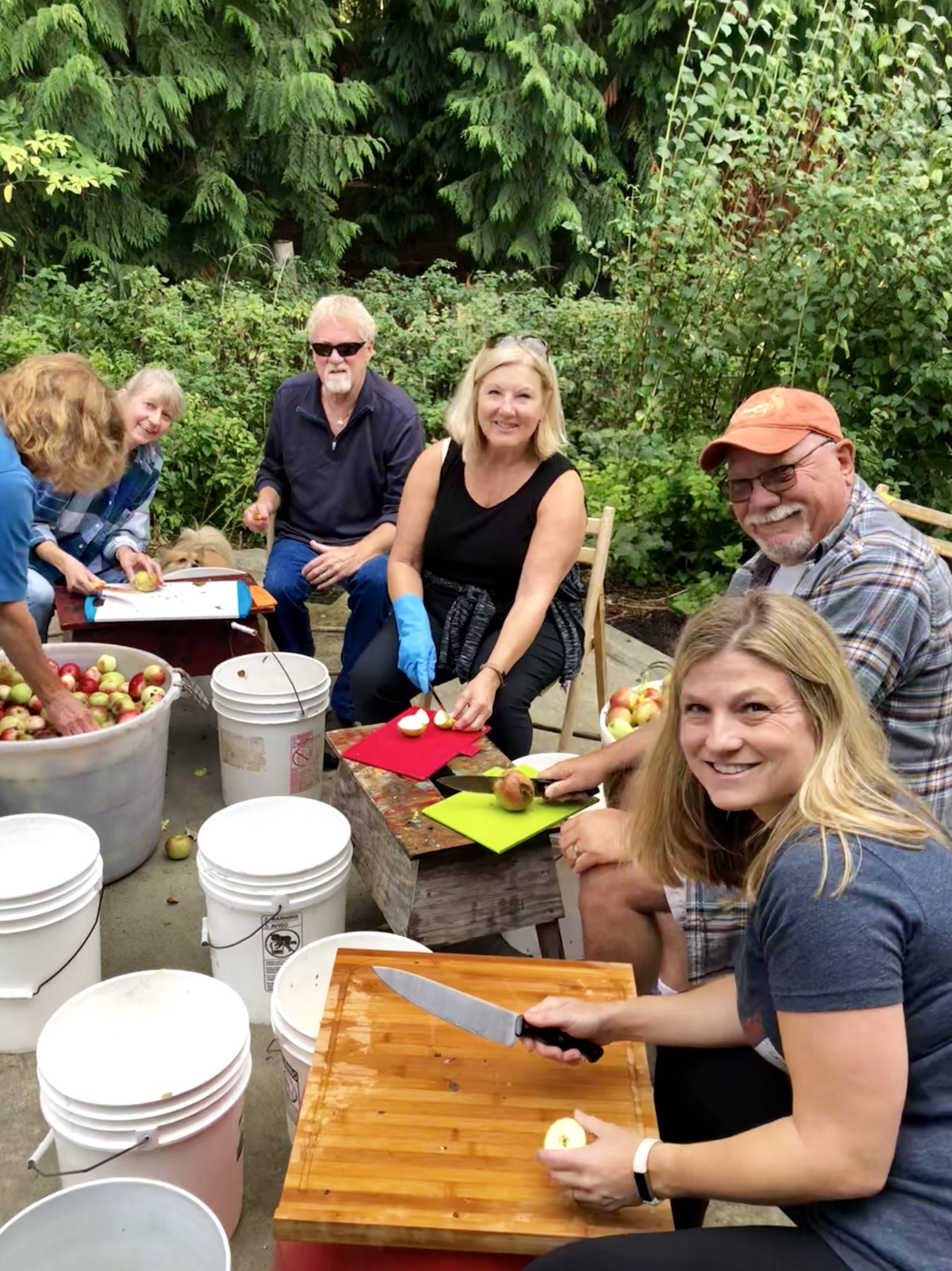Autumn means a lot of things on Whidbey Island, but one that invariably tops the heap is a plethora of cider happenings from north to south and everywhere in-between. When the air turns crisp, so do dozens of apple varieties hanging from laden branches in backyard groves, cultivated orchards and community gardens across the island.
This fall, there are many ways Whidbey residents can get their cider fix, whether they prefer hard, soft, spicy or sweet, fresh-pressed or pop-top ready to go.
The Northwestern Washington Research and Extension Center maintains a database of 73 cider apple cultivars grown at its facility in Mount Vernon and explains that cider apples are specific varieties with characteristics that make them desirable for fermentation into cider.
Lindsay Krug from Driftwood Hard Cider on South Whidbey agrees, noting that their cidery grows or sources apples with “all the aspects of cider we want – acid, tannin, sugar and aroma.” She also points out that great apples are not like table apples that people would want to eat fresh.
Some growers refer to them as “spitters” because of the high astringency and bitterness due to the tannins. The cider program at Washington State University uses the English classification system that separates cider apples into four different categories based on the tannins and acids present in the juice after pressing.
Driftwood balances the flavor in its signature Whidbey Heirloom Cider by mixing varietals such as crabapples, Gravensteins, king and red and golden russets, all of which have their own sensory evaluations on the classification systems. For example, the Mount Vernon center evaluates Gravensteins as “sharp” with a good aroma but not complex, sour with a lingering tang, a short aftertaste and refreshing character.
A 100-plus-year-old apple orchard at the Krug family’s Spoiled Dog Winery helps Driftwood keep up with the growing demand for its cider year-round. The relatively new cider venture started with the 2017 harvest, after Lindsay and Jake Krug moved to Whidbey Island from Denver, along with their two children Brandon and Hadley, to be closer to their family, change their pace of life and help run the winery.
“There are always challenges with starting a new business, and we decided to do this at the same time as learning the wine industry,” said Lindsay.
“The good news is that the community has been amazing and has shown so much support from day one of hearing that we were going on this new adventure of cider making. Everyone seemed excited to finally have a commercial cider for Whidbey to call its own.”
Driftwood plans to remain local, producing handcrafted ciders in small quantities. Its “Whidbey Heirloom” and “Island Crush” hard ciders will one day be accompanied by a true rose hard cider made from estate apples grown in the newly planted orchard of “red flesh” apples on the Spoiled Dog Winery property.
Though Driftwood is the only company actually producing cider on Whidbey, it has a growing number of Pacific Northwest compatriots adding to the cider scene on the island. Josh and Jen Peters, owners of Farmer and the Vine in Bayview, host a monthly cider tasting every fourth Friday to introduce regional ciders served in their relatively new and greatly expanded space at Bayview Corner.
The cider tasting menu at Farmer and the Vine rotates with offerings from cider-makers such as Washington Gold Cider from Chelan and Alpenfire and Eaglemount ciders from Port Townsend. From 75 to 90 percent of the ciders sold at Farmer and the Vine are from the Pacific Northwest, according to Josh Peters.
The primary Whidbey Island Cider Festival event kicking off the 2019 season takes place in Coupeville on Saturday, Sept. 28. It’s hosted by the Pacific Rim Institute and features cider tastings from regional cideries along with live music, loads of family-friendly activities (including Grandpa Rufus), and food from Oystercatcher, Coupe’s Last Stand and Chris’ Bakery.
The crew from Muscle and Arm Farm are a big part of cider season on Whidbey and will be at the festival selling caramel apples and about 60 different types of mini-dwarf apple trees. Festival-goers are encouraged to bring along a couple of their own apples for information and identification by the experts.
A main attraction is the festival’s apple pressing, during which the apples are provided and anyone can help make and drink their own fresh-pressed apple juice. Among the cider companies offering hard ciders for ages 21 and over are Driftwood, Alpenfire, Finnriver, Schilling, Bellingham Cider Co. and Chatter Creek.
Harvest fairs and festivals across the island include cider activities within the overall program.
At the brand-new Whidbey Island Harvest Festival in Langley, which runs from Oct. 3-6, local Sherrye Wyatt will be conducting a cider appreciation class, while Daniel Vorhis from Muscle and Arm Farm leads a free discussion at noon on Oct. 3 on how to grow organic apples on Whidbey.
Two more chances to experience hands-on cider pressing are the Greenbank Farm Harvest Faire and the South Whidbey Tilth’s farmers market. The Greenbank Farm event, which is hosted by the Port of Coupeville, happens from noon to 5 p.m. on Sept. 29 and it’s all free: apple pressing, live music, local farm produce, arts and crafts, and plenty of pumpkins.
At the Tilth farmers market on Thompson Road, the cider pressing takes place during its free Harvest Festival on Sept. 22, where islanders can also kick up their heels to live bluegrass music by Cranberry Bog.


